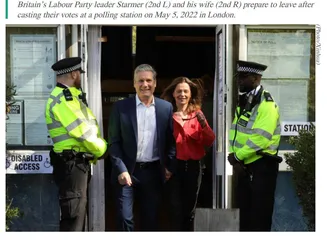New Consensus of the British Party Politics and the Prospects of the UK-Europe Relations
作者: Wang Zhanpeng

After the Brexit referendum, British politics went through the most turbulent period since the end of World War II. In less than four months during the summer and autumn of 2022, the UK had two Prime Ministers and three Chancellors of the Exchequer. Words such as “Italianize”, “moment of crisis”, and “national decline” popped up in the discussions on the UK. To observe and understand UK-European relations, it is important to look at political parties’ competition and their policy adjustments in response to the crisis.
Brexit and the Evolution of British Party Politics
In post-WWII British party politics, policies of the two major parties, the Conservative Party and the Labour Party, converged and diverged during party competition. The Labour Party vigorously pushed forward social democratic reforms, and the Conservative Party passively accepted most of the policy propositions of the Labour Party, laying the foundation of post-WWII consensus politics. The radical liberalism reforms of Margaret Thatcher’s administration and new Labour Party’s adoption of the “third way” of market capitalism have, to some extent, remoted the development of consensus politics in the UK. Since the beginning of the 21st century, Western capitalism has faced a number of challenges, including economic and financial crisis and the rise of populism. Relationship with Europe has become a new issue of party political competition in addition to the traditional Left and Right-wing ideologies in the UK. Both the Conservative Party and the Labour Party have been trying to respond to these challenges by repositioning themselves. After Jeremy Corbyn became the Leader, the Labour Party turned left; whereas around the 2016 Brexit referendum the Conservative Party has been mired in internal strife on relations with Europe. With the liberals sidelined, Boris Johnson emerged as the spokesman for the party’s right-wing and hardline Eurosceptic factions.
In 2019, the Conservative Party won the election, and British politics returned to the two-party model in format. But stability did not return to British politics. The legacy of Brexit - the ideologization of party politics, populism, and electoral politics - has exerted a significant impact on the Conservative government’s internal and external policies. In the post-Brexit phase, UK-EU relations are no longer the most pressing political issue in Britain. COVID-19 pandemic, rising cost of living and the escalation of the Ukraine crisis have shifted the British government’s attention. But the implications of Brexit, intertwined with these new problems, are still an important factor that directly or indirectly affects the direction of British party politics and the country.
For the Conservative Party, Brexit has resulted in reshuffling and reorganization in the party. After the 2019 election, the hardliners who are against European integration and advocate politics first have dominated the party leadership and parliamentary caucus. They have become a major force shaping policy formulation. At the beginning of Johnson administration, he put forward a regional balance program to dovetail social welfare with industrial strategy. However, the administration did not come up with practical measures to implement these policies. Due to the impact of COVID-19, the living cost continued to rise. Its ability to solve economic and social problems has raised doubts. In addition, the Johnson administration, haunted by corruption scandals, was weakened politically. Upholding the purity of Brexit and a tough stance on China and Russia have become a bargaining chip to gain the support of right-wing factions. As Britain’s economic woes worsened, it is all the more difficult to deliver the dividends proposed by the Brexit faction, such as immigration control, FTA network, and economic growth. This has resulted in a backlash from the public, the business community, and even the pragmatics within the Conservative Party.
After losing four elections in a row since 2010, the new Labour Party leadership is faced with the urgent task of reorienting the party and regaining power. After the defeat in the 2019 election, the struggles between the leftists and the rightists or between the Corbyn faction and the Blair faction within the Labour Party has intensified. After Keir Starmer became the new leader of the Labour Party in April 2020, he first adopted the strategy of ideological silence, downplaying the left-wing ideological discourse to avoid the division of the Labour Party. Gaining a foothold within the party, the new Labour Party leadership gradually distanced itself from Corbynism.
With Brexit becoming a reality and people longing for stability, the Labour Party adjusted its policy towards the EU. Keir Starmer said that the Labour Party could not seek major changes in Britain’s relationship with Europe, the country should be united and look forward. If the Labour Party won the next election, it could immediately start to address the people’s concerns such as energy consumption, the high living cost, housing shortages, etc., actively respond to climate change, and improve the National Health Service and other services related to people’s immediate interests.